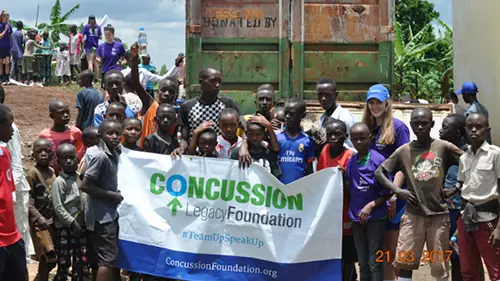Posted: September, 2017
In March, I went on a two-week school service trip to Rwanda. I felt so much better symptom-wise, and I wanted to challenge myself. It was extremely hot, very sunny, and we had long days with intense physical service work. We spent a few days in Kigali before a daylong safari and ended with a long stay at Agahozo Shalom Youth Village, a boarding school for Rwanda’s most vulnerable youth. Two years ago, I don’t think I would have been able to go on such a strenuous trip. This year I had an amazing time there and participated to the fullest. I took a 10 mile hike at midday where we were swarmed by kids from the local villages who walked with us and whom we taught the ABCs, I enjoyed long bus rides, and I formed amazing friendships with students I met in Rwanda and with my peers with whom I travelled. Taking that trip made me feel very confident that all the worst of my symptoms were gone and reassured me that my road to recovery was near complete — I want to tell you that yours is, or will be, too.

If you’ve read my previous blogs, and experienced them yourself, you know how rough concussion and PCS can be. I wanted to deliver you an update. I was out of school for the 2015-2016 academic year with some tough symptoms. Now, having had a great junior year, heading into my senior year, and looking forward to college, I can assure you that you can get so much better. It may not happen overnight, but looking back at my medical leave year and the blogs I wrote then, things have changed so much.
Through the Concussion Legacy Foundation and my website, Headstrong, I want to keep telling you my stories, the good and the bad. I think it’s important to keep in mind where you’ve been and how far you’ve come in your recovery, wherever you are, but I also don’t want you to feel that PCS is going to be forever.
It’s important to remember that thoughtful changes can make a world of difference: harnessing little memory tricks, opting for dinners with friends rather than parties with loud music, remembering your sunglasses. And having friends who understand makes a world of difference.
Now, I feel that the worst is far behind me, and that I am able to successfully manage a few residual symptoms. I am capable of anything academically and professionally; I’ve handled myself at a tough private school, and I undertook an intense internship this summer. At this point, other than contact sports, there isn’t really anything that I cannot do.
So if you feel that you’re in for the long haul, the load gets a little lighter each week, and at some point, you’ll barely notice the burden.